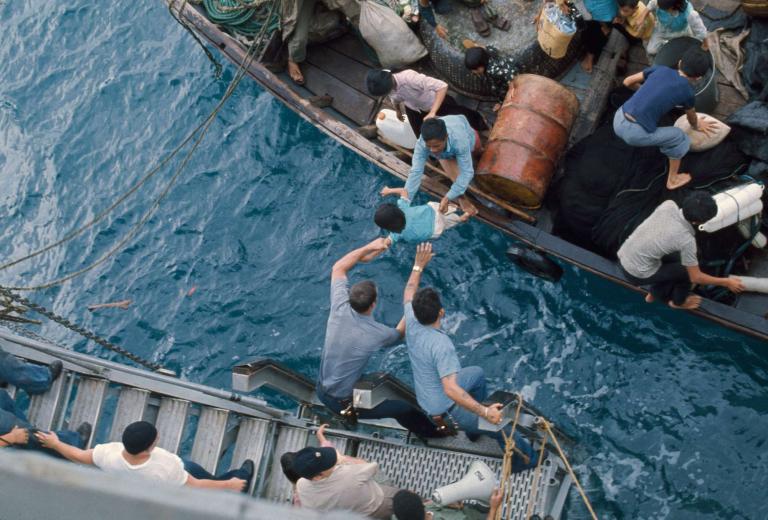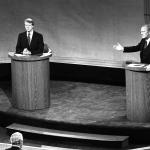
Over the weekend, while speaking to an audience of American evangelicals associated with the Faith and Freedom Coalition, former President Donald Trump did what often does on the campaign trail: talk about migrants. He described migrants as people who “come from prisons” and are “nasty” and “mean.” But as the New York Times reported, he went further this time and talked about pitching a new idea to Dana White, one of his supporters and the chief executive of the Ultimate Fighting Championship. “Why don’t you set up a migrant league of fighters?” he said. “And then you have the champion of your league — these are the greatest fighters in the world — fight the champion of the migrants?” he said. Predictably, people pushed back against these comments, which, he explained later, were in jest. “It was a joke, it was a joke,” he said.
It was quite a time to make a joke. Just three days before President Trump made these comments, people across the globe observed World Refugee Day, a day set aside by the United Nations to celebrate and honor refugees and promote public understanding of the millions of people who are forced to migrate due to persecution, war, violence, human rights violations, natural disasters, and more. And, of course, it was quite a setting to make a joke of this nature—before an audience of American evangelicals, who have a long history of actively supporting refugee resettlement work.
The experiences of refugees, along with Trump’s dehumanization of migrants like them, are anything but a joking matter. Refugees are on the move because they have experienced unspeakable traumas. They face enormous challenges in their search for safety, and in the process, they demonstrate a degree of strength, resilience, and hope that offers a model for all of us. Moreover, how American Christians across the denominational spectrum respond to migrants, especially vulnerable migrants like refugees and asylum seekers, speaks volumes about the seriousness of their commitment to values of compassion, justice, freedom, hospitality, generosity, and love.
Throughout American history, people of faith have played an important role in reminding our country of these values. At a time when politicians in the United States and around the world are exploiting xenophobia and using immigration and refugee issues as a chance to score political points, American Christians have an opportunity and a responsibility to do what they’ve often done powerfully in the past: remind the broader public that refugees are human beings with inherent worth and dignity and show through their words, actions, and political activities what it means to live out the Biblical call to welcome the stranger and love their migrant neighbors.
To do so requires American Christians to be willing to be a bit countercultural. As I show in my recently published book, Americans don’t have a good track record of being welcoming to refugees. A survey of public opinion polls, for example, reveals that Americans have a long and ugly history of being reluctant to admit refugees and have sometimes even been outright hostile toward them. For example, in the wake of Kristallnacht in late 1938, a Gallup poll found that only 21 percent of Americans surveyed believed the United States should welcome a larger number of Jewish exiles fleeing Nazi Germany; 72 percent said it should not. Public opinion polls after the Vietnam War showed similarly low support for resettling Southeast Asian refugees. One national Gallup poll conducted in May 1975, shortly after the fall of Saigon, found that only 36 percent of Americans surveyed favored the resettlement of Southeast Asian refugees; 54 percent of Americans surveyed opposed it.
Today, American public opinion about refugees actually seems more sympathetic than in the past. In a 2022 survey about immigration policy, the Pew Research Center found that around 72 percent of Americans considered accepting civilian refugees fleeing war and violence in other countries to be either very or somewhat important. While only 28 percent considered refugee admissions to be a very important policy priority, a clear majority expressed at least some level of support for welcoming refugees.
However, the same survey found that support was less consistent when one considered party affiliation, race and ethnicity, and religious affiliation. 41 percent of survey respondents who identified as Democratic or who independents who leaned Democratic said that refugee admissions very important, compared to only 13 percent of their Republican and Republican-leaning counterparts.
The Pew survey found that attitudes about refugees also varied by religion and race. 80 percent of Hispanic evangelicals, 79 percent of Black Protestants, and 78 percent of Hispanic Catholics said that it was somewhat or very important for the United States to accept refugees. In contrast, 68 percent of White evangelicals agreed with these statements, and White evangelicals and White Catholics had the highest levels of survey respondents (30 percent) who said that refugee admissions was not at all important or not too important.
The fact that a full 30 percent of White evangelicals and Catholics in the United States expressed this level of non-support for refugees is deeply concerning for several reasons. First, ongoing conflicts around the world continue to displace millions of people, who continue to need help. According to the United Nations High Commissioner for Refugees, at the end of 2023, over 117 million people around the world the world were forcibly displaced due to war, persecution, violence, human rights violations, and more. A decade earlier, that number was less than half that number—51 million people.
The low levels of support for refugees among many white American Christians also stands in contrast to the long and rich history of American churches showing courageous compassion for the world’s dispossessed. Throughout the twentieth century, American Christians regularly called their fellow Americans to conscience and led efforts to support relief and resettlement efforts at the global, national, and local levels. As I showed in my book, American Christians across the denominational and theological spectrum provided the material, manpower, and moral support necessary to resettle a million Southeast Asian refugees in the last quarter of twentieth century. They lobbied national leaders to increase the number of refugees resettled in the United States and urged the federal government to provide generous funding for humanitarian programs in refugee camps overseas. They worked with state governments to provide refugees with a wide array of social services. And at the local level, they volunteered to do the humble and necessary work of helping refugees settle into new homes, seek medical care, enroll in schools, learn English, use public transportation, navigate the legal system, secure government benefits, and contend with racist and xenophobic violence, harassment, and discrimination. They were not only staunch allies of refugees, but also sometimes also their first friends in America.
The energetic effort to aid refugees is still happening across America today, but this work is in danger. First, if President Trump is elected in November, he could drastically reduce the number of refugees accepted for resettlement, as he did in his first term. This action forced the closure of hundreds of resettlement agencies, many of them faith-based, which diminished the overall capacity of the resettlement system. In addition, there are the dangers of the rhetoric that we saw on display this past weekend—language and jokes that dehumanize immigrants and refugees and erode public support for migrants as well as the policies and programs that are a lifeline for them.
It might be tempting to throw up one’s hands and declare that there isn’t anything that can be done to address the rhetoric of politicians during a contentious election year. However, for those who care about refugees, recent research gives some reason to be hopeful and feel a sense of agency. In an article published in Political Behavior earlier this year, social scientists found that even in our hyper-partisan era, opinion can shift on refugees—especially when people talk about refugee issues in terms of Christian values. Researchers observed that the effects of this moral reframing was stronger among those who were most committed to their identities as evangelicals, even if they also identified as strong Republicans. Put simply, they found that one way to push back against pervasive anti-refugee sentiment is to talk about refugee issues in relation to Christian values and Christian identity. I would add that providing people with concrete and specific examples of how American Christians have lived out these core values in the past can be helpful.
American Christians have an opportunity and responsibility to meet the moment by leaning into their values, embracing their history, and speaking courageously about the importance of ensuring that the United States will be a welcoming country for refugees, now and in the future. The current needs of refugees is dire—a matter that is anything but a joke. In contrast to some of our politicians, American Christians can choose to use their words, actions, and votes to create a different conversation about forced migration. What they do could mean life or death for millions of displaced people around the world.













